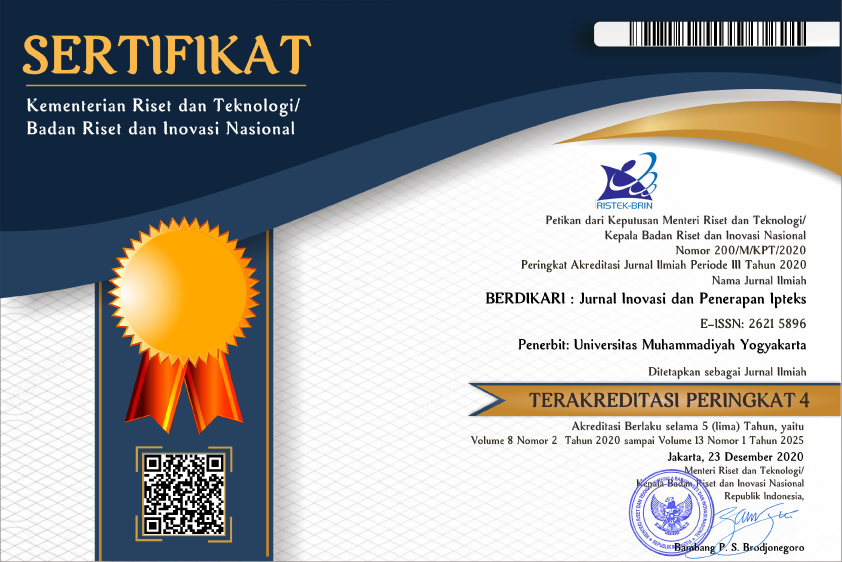Pembudayaan Permainan Tradisional sebagai Wahana Belajar Luar Ruang bagi Anak
DOI:
https://doi.org/10.18196/berdikari.v9i1.9265Keywords:
Traditional Games, Outdoor Education, Kampung Literasi Tebel BaratAbstract
The Covid-19 pandemic has made children even more interested in playing gadgets. The purpose of this community service activity is to reduce and change the dependence of early childhood on modern games, especially games on gadgets or smartphones. The method used was Participatory Rural Appraisal (PRA) by involving the Bait Kata community to design the concept of a literacy village, Karang Taruna to help socialize activities, and Dasa Wisma group to design UMKM and tourism awareness groups in Tebel Village, Gedangan District, Sidoarjo Regency. This community service activity develops the concept of learning and playing traditional games in one place that is integrated between playing, learning and becoming a center for educational tourism for children. The expected output targets include making the literacy village a center for children's educational tourism in Sidoarjo and improving the welfare of the surrounding community through educational tours. The result achieved in this program is the establishment of a reading terrace where children learn various knowledge from textbook and novel sources to foster children's interest in reading and writing, as well as traditional games such as stilts, clogs, and congklak (a playing board with two parallel rows of circular depression) that train interaction, cooperation, empathy, and children’abilities at mathematics. For the surrounding community, this service has helped empower the community's economy through UMKM in the field of traditional games and food called Kampung Literasi culinary corner. Teras Baca and UMKM center have been integrated and are ready to become an educational tourism destination of Kampung Literasi Tebel Barat.
References
P. A. Chusna, “Pengaruh Media Gadget Pada Perkembangan Karakter Anak,” Din. Penelit. Media Komun. Sos. Keagamaan, vol. 17, no. 2, pp. 315–330, 2017, doi: 10.21274/dinamika/2017.17.2.315-330.
Kemdikbud, “Data Pokok Pendidikan Direktorat Jenderal Pendidikan Anak Usia Dini, Pendidikan Dasar dan Pendidikan Menengah,” 2020. https://dapo.dikdasmen.kemdikbud.go.id/ (accessed Sep. 17, 2020).
Kemenag, “EMIS DASHBOARD,” 2020. http://emispendis.kemenag.go.id/dashboard/ (accessed Sep. 17, 2020).
I. Nurul Qamari and L. Joko Suryono, “Peningkatan Kualitas Layanan Dan Tata Kelola Pendidikan Anak Usia Dini Kenanga Panggung Harjo, Sewon, Bantul,” BERDIKARI J. Inov. dan Penerapan Ipteks, vol. 5, no. 2, pp. 126–136, 2017, doi: 10.18196/bdr.5226.
I. W. Hidayati and N. Usman, “Peningkatan Minat Baca Masyarakat Melalui Wisata Leterasi,” BERDIKARI J. Inov. dan Penerapan Ipteks, vol. 8, no. 1, pp. 59–64, 2020, doi: 10.18196/bdr.8177.
L. S. Kwary and C. Wonoseputro, “Fasilitas Rekreasi Edukatif Permainan Tradisional Jawa di Daerah Istimewa Yogyakarta,” vol. 1, no. 2, pp. 125–132, 2013.
K. Adimihardja and H. Hikmat, Participatory Research. Appraisal : Pengabdian dan Pemberdayaan Masyarakat. Bandung: Humaniora, 2003.
R. Darmastuti, S. W. M. Edi, and E. Christianto, “Model Literasi Media Untuk Anak-Anak Sekolah Dasar Dengan Menggunakan Multimedia Interaktif Berbasis Kearifan Lokal Masyarakat Salatiga,” J. ASPIKOM, vol. 3, no. 4, pp. 635–649, 2018, doi: 10.24329/aspikom.v3i4.220.
P. P. Setian and T. A. Cahyono, “Media Pembelajaran WARTOP (Wayang Karakter Tokoh Pahlawan) Untuk Menumbuhkan Jiwa Nasionalisme Mahasiswa IKIP Budi Utomo Malang,” Hist. J. Pendidik dan Peneliti Sej., vol. 1, no. 2, pp. 17–24, 2018, doi: 10.17509/historia.v1i2.9749.
N. E. Saputra and Y. N. Ekawati, “Permainan Tradisional Meningkatkan Kemampuan Dasar Anak,” J. Psikol. Jambi, vol. 2, no. 2, pp. 48–53, 2017.
H. Nur, “Membangun Karakter Anak Melalui Permainan Anak Tradisional,” J. Pendidik. Karakter, vol. 3, no. 1, pp. 87–94, 2013, doi: 10.1016/j.jsams.2018.05.001.
N. Laily, I. B. Raharjo, and D. Efendi, “PENDAMPINGAN KAMPUNG SAWUNGGALING, MENUJU KAMPUNG PENDIDIKAN –KAMPUNGE AREK SURABAYA (KP-KAS),” vol. 1, no. 2, pp. 12–25, 2019.
D. Herdiana, R. Heriyana, and R. Suhaerawan, “Pemberdayaan Masyarakat Melalui Gerakan Literasi Perdesaan di Desa Cimanggu Kabupaten Bandung Barat,” J. Pengabdi. Pada Masy., vol. 4, no. 4, pp. 431–442, 2019, doi: 10.30653/002.201944.208.
S. Pandapotan, S. P. Pakpahan, A. Hendrick, F. Keguruan, D. Ilmu, and U. Terbuka, “Pengembangan Model Kampung Literasi untuk Meningkatkan Motivasi Pendidikan dan Minat Membaca Masyarakat Desa Kolam Kabupaten Deli Serdang,” vol. 1, no. 2, pp. 110–126, 2020.
T. Widyastuti and R. Juni Astuti, “Penataan Halaman Sekolah Sebagai Ekoedukasi,” BERDIKARI J. Inov. dan Penerapan Ipteks, vol. 4, no. 1, pp. 54–62, 2016, doi: 10.18196/bdr.416.
K. Malik, “Perbedaan Nilai (Value) Dan Makna (Meaning) Budaya Permainan Egrang Di Empat Negara,” Gorga J. Seni Rupa, vol. 8, no. 1, pp. 197–202, 2019, doi: 10.24114/gr.v8i1.13166.
Downloads
Published
Issue
Section
License
Copyright
Authors retain copyright and grant BERDIKARI Jurnal Inovasi dan Penerapan IPTEK the right of first publication with the work simultaneously licensed under an Attribution 4.0 International (CC BY 4.0) that allows others to remix, adapt and build upon the work with an acknowledgment of the work's authorship and of the initial publication in BERDIKARI Jurnal Inovasi dan Penerapan IPTEK.
Authors are permitted to copy and redistribute the journal's published version of the work (e.g., post it to an institutional repository or publish it in a book), with an acknowledgment of its initial publication in BERDIKARI Jurnal Inovasi dan Penerapan IPTEK
License
Articles published in the BERDIKARI Jurnal Inovasi dan Penerapan IPTEK) are licensed under an Attribution 4.0 International (CC BY 4.0) license. You are free to:
- Share — copy and redistribute the material in any medium or format.
- Adapt — remix, transform, and build upon the material for any purpose, even commercially.
This license is acceptable for Free Cultural Works. The licensor cannot revoke these freedoms as long as you follow the license terms. Under the following terms:
- Attribution — You must give appropriate credit, provide a link to the license, and indicate if changes were made. You may do so in any reasonable manner, but not in any way that suggests the licensor endorses you or your use.
- No additional restrictions — You may not apply legal terms or technological measures that legally restrict others from doing anything the license permits.




